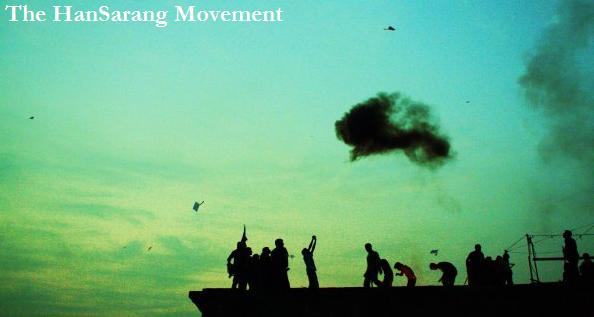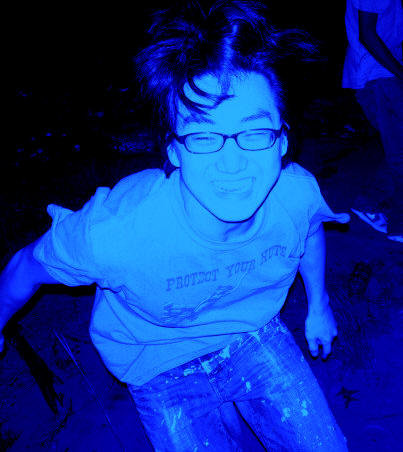The First Amendment is a right that we as Americans hold dearly with pride. But at the same time, this right comes with its own limitations and hypocrisies. You can't falsely yell "FIRE" in a public facility nor can you publicly declare that you want to assassinate the President. These things will immediately get you in serious trouble. However, the KKK can rally in a neighborhood even if nobody wants them there, and anti-abortionists can wave around bloody fetus dolls. While these voices are frowned upon, nevertheless, they have the right to express what they need to say. Yet there have been times when highly controversial opinions have been silenced because they dared to say something different, especially when it comes to matters that make people uncomfortable.
Two weeks ago, I uploaded a spoken word piece on YouTube that pertained to my former self-hatred as a Korean-American, my unfathomable connection with the VA tech shooter, Seung-Hui Cho, and as a result, me finding love and acceptance with my racial identity. The poem was titled: "To Seung-Hui Cho". The poem was not about condoning or glorifying Seung-Hui but rather how his life and mental health issues inexplicably found a connection with my own troubled youth. I put a warning in the description box that the poem would be very controversial and that it required the viewers to listen with an open mind and heart. This is the poem in its written form:
To Seung-Hui Cho
By Edward Hong
To society, he was a lunatic and a monster.
To his parents, he was their only boy.
To me, he was my brother,
The brother I never had.
Self-hatred defined my Korean identity.
Because if we are to suffer
The uncontrollable rages of our fathers,
The hesitant silences of our mothers,
The sounds of chink and gook by strangers,
Then I do not want to be Korean,
I do not want to be Asian,
I do not want this yellow skin,
I do not want this yellow sin.
Because of this self-hatred,
Hatred that made me hate the world,
I could not help but feel connected with Seung-Hui.
If he is indeed a monster,
Then am I a monster as well?
As I delved deeper into his life
And saw how his intertwined with mine,
As my world grew darker and overshadowed with his,
Am I any different from my silent brother?
So I had to look deeper within myself
And there, I found something so simple within myself:
I have too much love to be driven to such despair.
I must learn to love myself and live out my life,
So I can give my love to the people around me.
I have a choice in how I want my story to be told.
I can be ashamed of my ugly past,
And inflict it on the world
Or I can accept it and let it be told,
Let something ugly be turned
Into something beautiful.
Now, I am proud of my Korean heritage,
The heritage that I once despised.
Proud enough that labels and stereotypes,
They cannot define who I am,
And who I want to be.
On March 14th, YouTube sent me an email that my video violated their community guidelines and without warning, the video was removed. Someone in the YouTube community saw the video, didn't like it, and then flagged it. From there, a flagged video is reviewed by the YouTube staff and in the case the video violates their community guidelines, they remove the video. I was not surprised that my video got flagged but I WAS surprised to see my video removed. Which means it's pretty clear what YouTube's stance is.
I strongly believe that I did nothing wrong and only expressed how I found appreciation and love for myself and my Korean identity in the unlikeliest of places. The poem was about me finding salvation from realizing the tangent connection between Cho and I and because of that, I was in despair. I was in despair because I could somehow relate with the VA tech shooter but from that despair, I was able to not blame my ugly past but to accept it and use it for good. I understand that the victims and family members of the students who lost their lives on that day would not want to hear anybody performing a poem about the man who committed this heinous act. If I was in their shoes, I wouldn't want to hear a silly kid talk about Seung-Hui Cho in that manner either. For that silly kid to actually thank Cho for anything would be absolutely outrageous and I completely understand that. I do not blame their anger at all.
But my only intention was to show that normal, ordinary people can find connections with what society calls monsters, psychopaths, and lunatics, because in the end, these "monsters" are just people whose paths have gone differently in a darker and hopeless direction. If I did not have the people who take their time out of their busy schedules to support and love me, God only knows what I would've become. More importantly, with this poem, I wanted to show that there are so many troubled Asian/Asian American kids out there, people who have serious mental health issues and are not even regarded seriously from society because they are the model minority folks or their own families because they must not be spoken. That was my message I wanted to spread and apparently YouTube didn't get the hint. When I researched YouTube's guidelines when it came to freedom of speech, this is what they had to say:
We encourage free speech and defend everyone's right to express unpopular points of view. But we don't permit hate speech (speech which attacks or demeans a group based on race or ethnic origin, religion, disability, gender, age, veteran status, and sexual orientation/gender identity)
It is unfair that I did not even get a warning before they took down the video nor did they specifically explain to me what they found to be considered dangerous and offensive in the video. It is made even more difficult that there is not a direct customer service contact that I can reach to. I am wondering whether or not discussions on racial identity and mental health issues, especially the dark and uncomfortable aspects, are even tolerated on YouTube.
Yet I know that one Internet website cannot stop what I want to share to the world because I do not want another VA Tech shooting to happen. I'm not talking about stopping it by just imposing gun controls, but rather what goes on in the hearts and minds of the angry, confused students and folks who have lost hope. If I could, I wanted to talk to Cho before April 16th, 2007, and tell him that he is not alone in feeling for what he feels. That together, instead of using the rage and anger to destroy, I wish I could've channeled his emotions to make something beautiful out of it. I can't because he made his decision and it cost him his life and 32 others.
But I still have mine.
Ever since that day on 2007, it has become a crusade of mine to let my words be known so that other folks, whether Asian, Black, Chicano, or Caucasian, who feel the same destructive rage and hatred that I once did, would know that they are not monsters for feeling what they feel.
I'm only 22 an yet I know with every fiber in my body that this is my life and the contribution I want to make to this world.



1 comment:
Thanks for info, I am always looking for something interesting on the Internet, i want to send
photos for your blog
Post a Comment